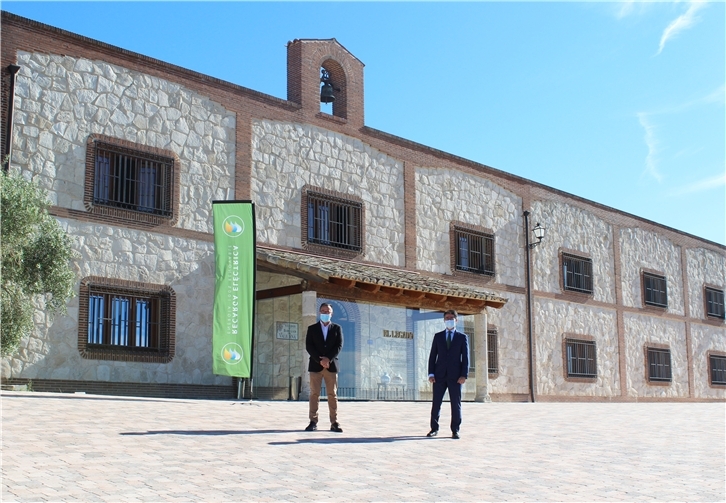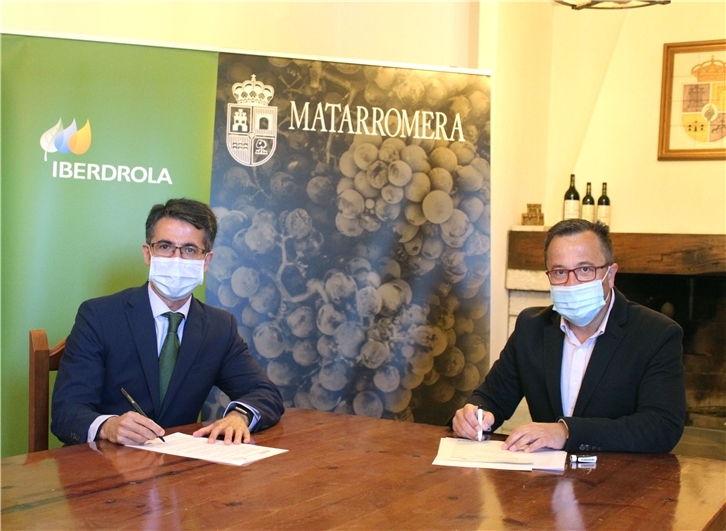News
It will install electric vehicle charging stations with 100% green energy in all its wineries in Valladolid, La Rioja and Ourense, Spain
Matarromera commits to electric mobility in collaboration with Iberdrola
- The initiative is part of the ambitious global sustainability project called ‘Sustainable Matarromera on Planet Earth’, one of the company’s pillars
- Iberdrola is moving full speed ahead with its sustainable mobility plan, which entails installing 150,000 electric chargers in homes, companies and on the public road network over the next five years
Bodegas Familiares Matarromera and Iberdrola have joined forces to combat climate change and encourage sustainable mobility through an agreement signed this morning in Valbuena de Duero (Valladolid, Castilla y León) to develop an electric vehicle charging infrastructure on its sites in Valladolid, La Rioja and Ourense. The alliance is for a total of 16 electric chargers supplying 100% green energy at the company’s Matarromera and Emina (DO Ribera) wineries; Emina (DO Rueda); Carlos Moro (DOCa Rioja); Valdelosfrailes (DO Cigales) and Casar de Vide (DO Ribeiro).
Operations manager at Bodegas Familiares Matarromera, Alberto Guadarrama, and Iberdrola’s sales manager in Castilla y León, Celiano García, signed the collaboration agreement to install the 22 kW charging stations over the coming months. These will be available to the public so that all electric vehicle users can charge during business hours.
The initiative is part of an umbrella sustainability project called “Sustainable Matarromera on Planet Earth”, which includes a set of priority measures such as reducing energy dependency and emissions, ecological production and environmental R&D+i projects.
Alberto Guadarrama explained that “sustainability has been a hallmark of the company since the start, promoted by founder Carlos Moro. All the wineries are sustainable buildings designed with natural light, optimal insulation and use of rain and residual water for watering the vines. In fact, it was the first Spanish company with AENOR certification to measure its carbon footprint, in other words, the environmental impact of producing its wines”.
Likewise, Celiano Garcia underlined that the company “has found the perfect ally to make progress implementing solutions to meet the challenge of electrical mobility based on clean energy and without Co2 emissions. He added that “transport electrification, together with the growth of electricity generated from renewable sources, will make a decisive contribution to reducing pollution in our cities and increasing energy efficiency”.
100% green energy and digital solutions
The users of this infrastructure will charge the batteries of their electric cars with 100% green energy from clean generation sources with certificates guaranteeing its renewable origin (GoO).
The charging points will be available on the Iberdrola Public Charging App, the only one in Spain with verified information about all Iberdrola's Public Charging points, and those belonging to other operators. The app enables drivers to locate charging stations, check the operational status in real time, book a charging point and pay with a mobile phone.
Iberdrola speeds up electric mobility
Iberdrola continues to push its stance for transport electrification as part of its strategy towards a decarbonised economy, as a key lever in the reduction of emissions and of city pollution, as well as for green recovery in the post-Covid world.
In March, the company decided to step up its sustainable mobility plan by making additional investments - a total of 150 million euros - to provide even more electric vehicle charging stations.
The initiative entails around 150,000 electric vehicle charging points in homes, companies and on the public road network in cities as well as on the main motorways and highways over the next five years. The commitment to deploying fast charging stations will see the company install ultra-rapid (350 kW) charging stations every 200 kilometres, super-rapid (150 kW) every 100 kilometres, and rapid (50 kW) charging stations every 50 kilometres.








